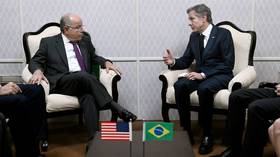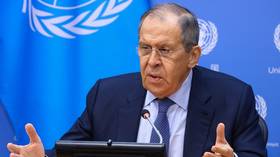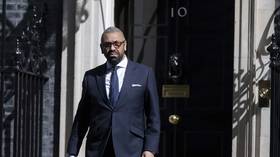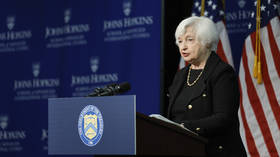Key nations resist US pressure regarding Russia – WaPo
Countries are trying to sit out the standoff between Washington, Moscow and Beijing, leaked documents seen by the paper suggest

India, Brazil, South Africa, Pakistan and other major emerging economies have rebuffed the Biden administration’s attempts to make them team up with the US against Russia amid the conflict in Ukraine, the Washington Post has reported, citing leaked Pentagon files.
According to classified US intelligence documents, which investigators believe were released online by US Air National Guard serviceman Jack Teixeira, India has no intention of taking sides in the standoff over Ukraine, the paper reported on Saturday.
One of the documents seen by the Post suggests that during a meeting in February, Indian National Security Advisor Ajit Kumar Doval told the Secretary of the Russian Security Council, Nikolay Patrushev, that New Delhi was resisting pressure to support a Western-backed UN resolution on Ukraine. India “would not deviate from the principled position it had taken in the past,” Doval reportedly assured the Russian official.
Another leaked file suggested that Brazil was more interested in playing a mediation role in the conflict than supporting Washington and its allies. Russia favours the idea of a “world peace bloc” to resolve the crisis over Ukraine, put forward by Brazilian President Luiz Inacio Lula da Silva during his visit to China earlier this month. Moscow believes it would counteract the West’s “aggressor-victim” narrative about Kiev, according to the document.
In late February, Brazil welcomed two warships from America’s arch foe Iran, with one of the files suggesting that Lula likely allowed the port call “to bolster his reputation as a global mediator and burnish Brazil’s image as a neutral power.”
The leaks also revealed that when US Secretary of State Antony Blinken visited South Africa last year and raised the Ukraine issue, he was told by local officials that Pretoria would not be “bullied” into making decisions that go against its interests, the Washington Post wrote.
An intelligence file from February 17 reportedly described discussions between Pakistan’s Prime Minister Shehbaz Sharif and his subordinate about an upcoming UN vote on Ukraine. It said the aide pointed out to the premier that support for the Western-sponsored resolution would signal a shift in Islamabad’s position, after its earlier abstention on a similar draft. Such a move would jeopardize important trade and energy deals with Russia, he warned, as cited by the Post. Pakistan was among 23 abstaining nations when the vote at the UN General assembly took place a week later.
As for Central Asian countries, their leaders were “eager to work with whoever offers the most immediate deliverables, which for now is China,” another leaked document, seen by the newspaper, suggested.
https://www.rt.com/news/575565-us-ukraine-india-brazil/






